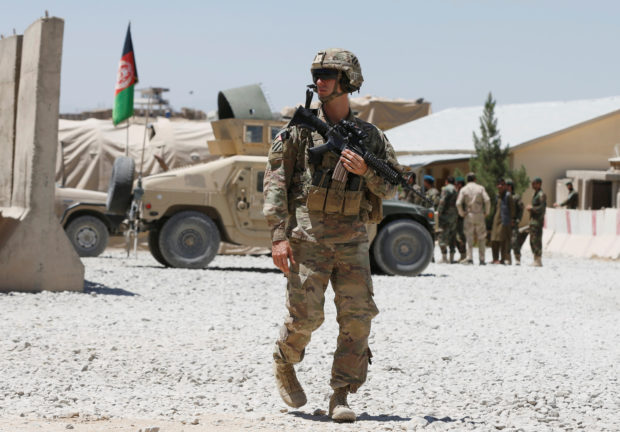
A U.S. soldier keeps watch at an Afghan National Army (ANA) base in Logar province, Afghanistan August 5, 2018. REUTERS FILE PHOTO
WASHINGTON — The U.S. military appears just days away from completing its withdrawal from Afghanistan, well ahead of the Sept. 11 deadline set by President Joe Biden to end America’s longest war, U.S. officials told Reuters on Tuesday, speaking on condition of anonymity.
The withdrawal of troops and equipment from Afghanistan would not include forces that will remain to protect diplomats at the U.S. embassy and potentially assist securing Kabul airport.
U.S. officials have told Reuters that embassy presence could be around 650 troops.
The U.S. military stopped publicly detailing the pace of its withdrawal after it was more than 50 percent complete earlier in June.
The disclosure of the brisk pace of the U.S. withdrawal comes as the Taliban insurgency ramps up its offensive throughout the country. The Pentagon now estimates the Taliban control 81 of the country’s 419 district centers.
Peace talks in Qatar, meanwhile, have failed to make significant progress.
The Pentagon said earlier on Tuesday that the U.S. withdrawal would not necessarily signify the end of NATO’s Resolute Support mission in Afghanistan, but referred further queries to NATO.
The withdraw of U.S.-led NATO forces has raised concerns that the country could erupt in full-scale civil war, potentially providing al Qaeda space in which to rebuild and plan new attacks on U.S. and other targets.
A United Nations report in January said there were as many as 500 al Qaeda fighters in Afghanistan and that the Taliban maintained a close relationship with the Islamist extremist group. The Taliban denies al Qaeda has a presence in Afghanistan.
U.S. Defense Secretary Lloyd Austin is expected on Wednesday to meet his Germany counterpart at the Pentagon. Germany, which had the second largest contingent of troops after the United States in Afghanistan, announced on Tuesday that it had concluded its withdrawal from Afghanistan.
It was unclear if the pace of the U.S. withdrawal would still allow first for a planned evacuation of thousands of vulnerable Afghan interpreters and their families, something that had been expected before the U.S. pullout.